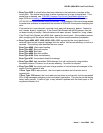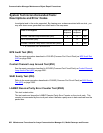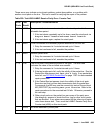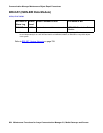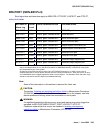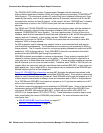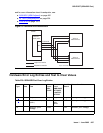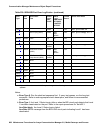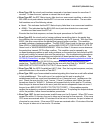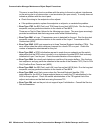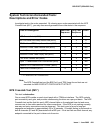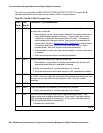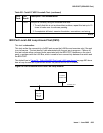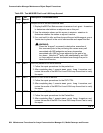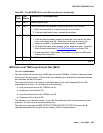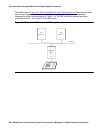
BRI-PORT (ISDN-BRI Port)
Issue 1 June 2005 689
c. Error Type 130: the circuit pack has been removed or has been insane for more than 11
minutes. To clear the error, replace or reinsert the circuit pack.
d. Error Type 257: the EPF Status Inquiry fails due to an overcurrent condition or when the
BRI-LINE circuit pack detects that the EPF is in an over current condition. The aux data
field contains one of the following values:
● blank – This indicates that the EPF Status Inquiry failed due to an overcurrent condition.
● 40988 – This indicates that the BRI-LINE circuit pack has detected an overcurrent
condition and has turned the EPF off.
Execute the short test sequence, and see the repair procedures for Test #622.
e. Error Type 513: the circuit pack is having problems transmitting data to the packet bus,
thus affecting the conveyance of signaling information over the D channel. With Aux Data
46222, this error occurs when the packet-bus transmit buffers overflow. This condition
probably indicates a hardware problem. The BRI-PORT Alarm Level for the error with Aux
Data 46222 is “MINOR/WARNING,” and the ABRI-PORT/ATT-PORT/LGATE-PT/ATTE-PT
Alarm Level is “MAJOR/MINOR/WARNING.” With Aux Data 0, this error occurs whenever
the packet-bus transmit FIFO buffers overflow. This condition can be caused by an
on-board hardware problem as well as by problems on the packet bus that disrupt the BRI
circuit pack’s ability to transmit data onto the packet bus. Use troubleshooting procedures
for both on-board hardware problems and potential off-board packet-bus problems. See
PKT-BUS (Packet Bus)
on page 1790 as well as Isolating and repairing packet-bus faults in
Maintenance Procedures (03-300192) for more information about troubleshooting the
packet bus. The BRI-PORT Alarm Level for the error with Aux Data 0 is “MINOR,” and the
ABRI-PORT/ATT-PORT/LGATE-PT/ATTE-PT Alarm Level is “MAJOR.”
f. Error Type 769: the NPE Crosstalk test (#617) fails. Run the long test sequence, and pay
particular attention to the results of Test #617.
g. Error Type 1281: a port’s associated broadcast-signaling links have too much traffic related
to link establishment. This could occur if an endpoint on this port is sending link
establishment traffic on a port level broadcast link or if there are Level 1 problems on the
port. Check the error logs for Level 1 errors. If Level 1 problems exist, follow the repair
procedures listed for Test #621. Software will suspend activity to this port for 75 minutes
when the port is alarmed due to this error (note that service suspension does not occur if
the port is an ABRI-PORT/LGATE-PT/ATTE-PT/ATT-PORT). If this problem persists,
replace the endpoint or endpoints associated with this port. If replacing the endpoints does
not fix the problem, follow normal escalation procedures.
h. Error Type 1537: the port receives an invalid frame over the D channel. When CRC errors
exceed five within 15 minutes, the port is taken out of service for five seconds. If five more
CRC errors are received within 15 minutes of the first set of five errors, the port is taken out
of service for one minute. If five more CRC errors are received within 15 minutes of the last
five, the port is taken out of service for 15 minutes.



